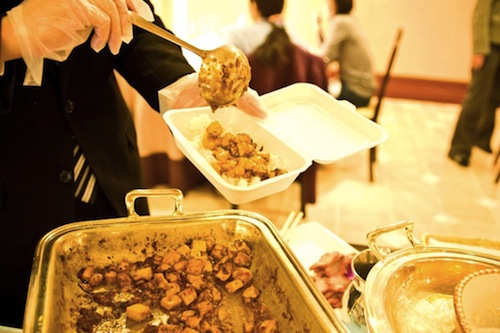Food
"Food Loss Challenge Project" - Let's help prevent food from being thrown away
2013.04.18 Taeko Ohno

A lot of food goes to waste in the food service industry. At the Shin Yokohama Kokusai Hotel, they have begun to offer a service that allows guests to take home food left over from their reception.
There are approximately 900 million people around the world who suffer from starvation. But did you know that at the same time, about 1/3 of the food produced for our consumption is being thrown away? The reasons vary - the food didn't keep, it wasn't sold in time, or there was just too much. The "Food Loss Challenge Project" was launched in December 2012 to find a way to change the food system.
The project co-created with Hakuhodo, the advertising agency in charge of the day-to-day operations of the project office, is represented by Ms. Emiko Onoki, a Programme Officer at the Food and Agriculture Organization of the United Nations (FAO) Japan. And as executive committee members, the project has welcomed incorporated NPO Hunger Free World and the Social Design Center of the Keio University, Graduate School of System Design and Management Research Institute. Ajinomoto Co., Ltd., Toshiba Tech Corporation, Nichirei Foods Inc., Mos Food Services, Inc. joined the first phase of the project organized from January to March 2013 as partners, and many consumers also took part to offer a wide range of perspectives.
Food loss is an issue that producers, business operators, and consumers are all facing. For example, farmers dispose of irregular produce or excess produce when the harvest is overabundant. Similarly, in the retail business, shops have to get rid of unsold goods, restaurants must dispose of leftovers, and at home, consumers throw away expired goods.
In March, the project members took part in a study tour to learn about what people working in the front lines of food loss reduction are doing. For example, they visited farmers that are engaged in farming activities that benefit and support the local community, minced fish manufacturer that uses leftover fish parts to create fish fertilizer, super markets that offer a wide array of produce while aspiring to sell off its inventory, hotels that have incorporated a doggy bag system, so that guests may take home food leftover from the reception, Izakaya restaurants that procure foods directly from producers and use them very efficiently, etc. The participants also studied food lifestyles of consumers.
The agricultural production corporation Agri Art Chibanousan and Tagayasu are attempting to reduce food loss in the production processes. In the Boso Peninsula of Chiba Prefecture, they also try to promote the sixth-order industrialization, revitalization of satoyama, the activation of communities, and more.
At the workshop held after the tour, the participants searched for solutions for the food loss issues while taking a bird's eye view of the food industry and culture from production, processing, distribution, food service industry, consumption, etc. They discovered new relationships. This is one such example - if consumers made smart choices while shopping, then sellers can bear that in mind and provide the appropriate supply, and producers can practice sustainable, eco-conscious farming.
Ms. Onoki explained, "It's very meaningful that all of us from different fields got together to make this project happen. In the end, what's important is having appreciation for food and the value of resources. We were able to discover key words that helped reexamine food cultures and lifestyles. We hope to summarize our findings and to promote further action."
Related URL/media










